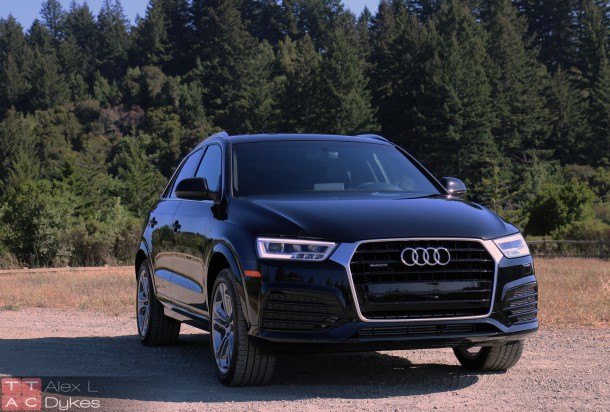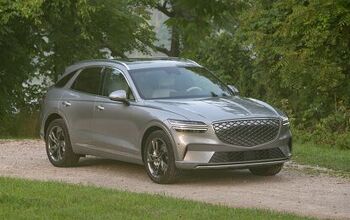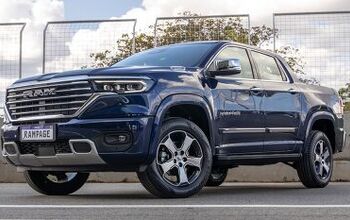2016 Audi Q3 Quattro Review - New-To-You Utility [w/ Video]

2016 Audi Q3 Prestige
2.0-liter, DOHC I-4, CVVT (200 horsepower @ 5,100-6,000 rpm; 207 lbs-ft @ 1,700-5,000 rpm)
6-speed Tiptronic automatic
20 city/28 highway/23 combined (EPA Rating, MPG)
20.2 mpg (Observed, MPG)
Tested Options: Prestige Trim, Quattro AWD, Sport Package
Base Price:
* Prices include $925 destination charge.
Audi’s Q3 isn’t a new vehicle by any stretch. It was first launched in 2011 but didn’t make it to America until the 2015 model year. That’s because the Q3 plays in a segment that’s new to us — the even-smaller compact luxury crossover. This form factor isn’t new to the rest of the world, but until Land Rover brought the Range Rover Evoque to America and BMW followed up with the X1, there wasn’t a real focus on small luxury soft-roaders.
With crossovers being the latest craze and every luxury brand looking to move down-market to capture fresh young buyers, it was only a matter of time till Mercedes and Audi joined the party with the GLA and the Q3. With a “low” $33,700 starting MSRP, the baby Audi is the more practical counterpart to Audi’s sharp-looking A3 sedan. Although CamCord shoppers have to give up a great deal of room to upgrade to the A3, the Q3 has the potential to be a more sensible option.
Exterior
At 172.6 inches long, the Q3 is nearly a foot shorter than the X3, Q5, NX or XC60. That means the Q3 is aimed squarely at the BMW X1, Range Rover Evoque and Mercedes GLA. Unlike the GLA and X1, the Q3’s side profile screams miniaturized SUV, not jacked up hatchback.
The rear design is 8/10ths Q5 despite being totally unrelated. Unlike most crossovers, the tail lamps are housed solely on the hatch itself. You’d think that this would allow the opening to be larger, but access is somewhat limited much like its bigger brother Q5. Total cargo room suffers more than you would think since Audi decided to give the rear window a more dramatic rake than on its other crossovers.
Interior
In an unusual move, Audi makes 12-way power front seats standard and equips them with 4-way power lumbar support. This puts front seat adjustability above the GLA, which skimps on passenger seat comfort to keep the price low. Also surprising, leather seating surfaces are standard while most luxury brands have moved to imitation leather as the base material. The optional sport seats are the most comfortable seats in this segment, according to my back, besting the BMW and Mercedes. Helping my marriage out during the week I had the Q3, the passenger seat is just as comfortable (eliminating the complaints I received when I tested the RDX and GLA). Like Audi’s A3, the Q3 lacks driver’s seat memory, an odd omission when you can find that feature on less expensive Kias, not to mention the Range Rover, BMW and Mercedes. Heck, Mercedes even gives the front passenger standard 3 position seat memory.
Thanks to the Q3’s upright profile, the rear seats are surprisingly accommodating. Although combined front and rear legroom figures are lower than the Q5 and the overall vehicle is smaller than the larger Audi, the Q3 was better able to handle a rearward facing child seat behind a front passenger. The difference is down to the shape of the Q3’s dash which allows the right front seat to move farther forward, freeing up more room in the back. Headroom was equally impressive despite the panoramic moonroof. BMW is claiming a hair more room in the 2016 X1 which will mean the Audi and BMW are the best options if you plan on carrying folks in the rear. On the other hand, the GLA has a more cramped rear bench and my head touched the ceiling unless I leaned inboard. When it comes to cargo hauling, the Q3’s hold is 33-percent smaller than the next size crossover and right about the same as your average midsize sedan.
Infotainment
On the flip side, MMI has probably one of the most advanced feature sets on the market thanks to their well-executed Google integration. While iDrive allows you to search for Google results (as do a number of other systems), MMI takes it a step further and overlays your traditional map images with Google satellite imagery and even allows you to zoom in and view Google Street View images so you can “creep” your neighbors. On the down side, the Google map function requires a $15-$30 a month subscription after the first few years for the built-in cellular modem, and the system has troubles downloading maps fast enough when traveling at freeway speeds, leaving you with a blank screen at times.
Although navigation and the Google Map love is optional, the large LCD and iPod integration are standard, things not found in the 2015 Mercedes GLA. Likely due to the Q3’s standard LCD and upcoming 2016 X1, Mercedes has announced the 2016+ GLA will get a 7-inch LCD standard.
Drivetrain
In order to keep costs down, American bound Q3 models ditch Audi’s 7-speed dual clutch for a more traditional 6-speed Tiptronic automatic. This means that in addition to being down on power, the Q5 is short on gears. Although 6-speeds is the norm in the mass-market segment, the GLA has a 7-speed DCT, the X1 uses an 8-speed and the Evoque a 9-speed. While the engine is partly to blame, the lack of gears has a distinct impact on fuel economy and acceleration. Despite being heavier, producing more power, and being faster to 60, the larger Q5 2.0T nets the same EPA combined score of 23 mpg in both front-wheel and all-wheel drive models. That’s behind the 24 mpg rating for the Evoque, 27 mpg for the 2015 X1 and significantly lower than the 29 mpg delivered by the GLA 250. In a week of mixed driving, our Q3 averaged under 21 mpg.
Drive
BMW is making all US-bound X1 models AWD. The logic is likely driving dynamics (like Jaguar with their ill-fated X-Type sedan) and not supposed off-road ability as found in the Land Rover Evoque. That sets the BMW apart from the Audi and Mercedes which both have front-wheel drive. Standard all-wheel drive solves the traction and torque steer problems found in a front driver, but it does little to address the nearly 60/40 weight balance found in most transverse engined vehicles. While the 2016 X1 may be the best balanced in this shoe box sized category, 56/44 (front/rear) is a far cry from BMW’s almost religious dedication to 50/50 weight balanced vehicles. This means that when chucking your 2016 crossover into a corner, the BMW no longer has a neutral handling advantage, and it’s where the strangely wide tires on the Q3 make a surprising difference.
BMW shoes the new X1 with 225-width tires, the narrowest in the segment, while the GLA and Evoque start with 235s. Audi starts with 235s on the base model, but the Premium trim and an $800 option on the base model kick the rubber up two sizes to 255/40R18s — two sizes larger than the GLA 45 AMG and three sizes ahead of the X1. While suspension tuning obviously plays a big role in road holding, the Audi starts with more grip and then adds an excellent suspension to boot. Despite the wide 40-series tires, the Q3’s suspension is tuned more compliant than the GLA 250 and lacks the unsettled behavior on broken pavement I noted in the Evoque. While BMW’s FWD models I’ve tested in Europe aren’t as dynamic as their RWD models, they are excellent for front drivers.
Although there is clearly more body roll in the Audi than in the GLA or GLA AMG, the Audi is quite simply more sure footed. Sure, the GLA is lighter at about 3,500lbs vs the Q3’s nearly 3,700, but the 200 pound difference can’t make up for the wider rubber on the Audi. While the 2015 BMW X1 with the M Sport package was the best handling vehicle in this segment by a hair, 2016 transfers the crown to the Q3. (And the difference in 2015 was smaller than X1 buyers would like to admit.)
On the downside, the Q3’s heritage does reveal. You see, the Q3 is not based on VW-Audi’s new MQB platform like the current Golf and A3, instead related to the older A3. That shows itself in steering feel. There isn’t any. While the rest of the competition also employs electric power steering, the Q3’s rack is particularly vague, although it is precise and well weighted. Also a problem is the Q3’s acceleration. The Audi’s 0-60 acceleration time clocked in at 7.6 seconds, slower than a Hybrid Camry and about the same as a Honda CR-V. That’s 8/10ths slower than the Evoque, a full second slower than the GLA 250 and 1.3 seconds behind BMW’s claim for the new 2016 X1. That’s before we consider the 2016 Mercedes GLA 45 AMG with its blistering 4.3 second 0-60 sprint thanks to a whopping 375 horsepower.
Although the Q3 is slower and thirstier than the GLA, value, interior accommodations and handling are where the Audi shines. Even though the $33,700 starting price of the Q3 is higher than the 2015 GLA 250 at $31,300, the Audi comes with standard leather seating, dual-zone climate control, xenon headlamps, a panoramic sunroof, keyless entry and keyless go, backup camera, iPod interface, auto dimming mirror, and HD and SiriusXM radio. All of these are extra on the Mercedes. This makes a comparably equipped GLA $3,000 more than the Audi. The Evoque is the most expensive, running $7,000-10,000 more than the Q3, and the 2016 X1 starts at $34,800 and would crest $37,000 when equipped comparably to a base Q3.
The surprising thing about the Q3’s pricing structure is how slowly the pricing builds compared to the other luxury options. This makes the Q3 perhaps the easiest upsell from a Hyundai Tucson or a VW Tiguan. Hyundai’s 2016 Tucson Limited ranges from $29,900-34,900 with equipment levels similar to a $33,700-39,000 Q3 making the bump a reasonable $5,000 or so. That’s much narrower than the distance between the Tuscon and GLA 250, which would end up $6,400-10,000 more when comparably equipped. The Range Rover Evoque? The Baby Rover is by far the premium entry and will set you back $15,000-20,000 more than a comparable Hyundai.
I know it sounds odd to compare an Audi and a Hyundai. In most other segments I would say it’s an inappropriate comparison. However, this crop of “inexpensive” luxury vehicles was designed to attract mainstream brand shoppers, so the comparison makes sense. In this light, the Q3 also makes sense. It’s a much easier up-sell over a mainstream crossover while delivering a luxury brand, luxury interior and the best handling in the segment. The X1 and GLA are faster to 60, the Mercedes is arguably a more premium brand and the Evoque offers a level of customization that higher-end luxury shoppers demand, but none of them is as easy of a cross-shop with the top-end mainstream CUVs. For that value proposition and handling performance the Q3 is my favorite entry in this segment, and it’s a new engine and 7-speed DCT away from perfection. Let’s hope someone at Audi is listening.
Audi provided the vehicle, insurance and one tank of gas for this review.
Specifications as tested
0-30: 2.85 Seconds
0-60: 7.6 Seconds
1/4 Mile: 16 Seconds @ 89.2 MPH

More by Alex L. Dykes
Latest Car Reviews
Read moreLatest Product Reviews
Read moreRecent Comments
- ToolGuy This thing here is interesting.For example, I can select "Historical" and "EV stock" and "Cars" and "USA" and see how many BEVs and PHEVs were on U.S. roads from 2010 to 2023."EV stock share" is also interesting. Or perhaps you prefer "EV sales share".If you are in the U.S., whatever you do, do not select "World" in the 'Region' dropdown. It might blow your small insular mind. 😉
- ToolGuy This podcast was pretty interesting. I listened to it this morning, and now I am commenting. Listened to the podcast, now commenting on the podcast. See how this works? LOL.
- VoGhost If you want this to succeed, enlarge the battery and make the vehicle in Spartanburg so you buyers get the $7,500 discount.
- Jeff Look at the the 65 and 66 Pontiacs some of the most beautiful and well made Pontiacs. 66 Olds Toronado and 67 Cadillac Eldorado were beautiful as well. Mercury had some really nice looking cars during the 60s as well. The 69 thru 72 Grand Prix were nice along with the first generation of Monte Carlo 70 thru 72. Midsize GM cars were nice as well.The 69s were still good but the cheapening started in 68. Even the 70s GMs were good but fit and finish took a dive especially the interiors with more plastics and more shared interiors.
- Proud2BUnion I typically recommend that no matter what make or model you purchase used, just assure that is HAS a prior salvage/rebuilt title. Best "Bang for your buck"!






































































Comments
Join the conversation
Somewhere in the vast empire that is VW with its 122 factories, some poor schmucks are STILL making the GTI Mark V engine, the original week-kneed, carbon-prone FSI engine that Audi gifted on the world in the mid-oughts. Making them still for some reason or other, none of them related to customer satisfaction. They couldn't be bothered to shove in the 2008 A4 version with 258 lb-ft of torque, because that would mean adding the variable exhaust valve lift system and cost them a hundred bucks. The only sane reason I've been able to fathom for their continuing manufacture is that they're cheap to make, and because they're a 2.0 turbo, VW/Audi can give the (false) impression that it's the same engine they're shovelling in the new GTI and A3. Hey, what's a 2.0t between friends, especially as it's North America only. It has high friction large diameter crank and rod bearings, plain bearings on the balance shaft and cheap DI injectors - compared to the new EA888 III in 1.8 and 2.0t form. So it gets lousy mileage to boot. So for North America, where the average soul is barely automotively awake, these engines can be shoved into Tiguans and now Q3s, where their lousy performance can be hidden behind marketing gloss. If there was ever a reason to avoid VW/Audi products, here's another really good one. They're a cynical company who don't give two hoots about customer satisfaction. But hoodwinking them? Game on!
I can vouch for this power train as it is the same as the Tiguan...Our loaded 2011 Tiguan SEL gets the REAL mpg speced - unlike the inflated numbers companies like Ford et al put out...a true 22-23 mpg around town...Considering you get an underrated 200hp with underrated torque numbers, I'd rather get a true 23 mpg in this vs 23 mpg in a weakling Nissan Rogue or similar. This is a proven engine that on most dynos is really more like 215 hp/230 lb-ft...We have over 63k nearly trouble free miles on our Tiguan...The passenger rooms is awesome for the small exterior size (only 172" long on the Q3), so a great compact CUV for urban areas. Now, all we need is the 2.0 TDI like the everyone outside N America gets...